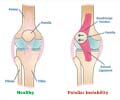The machine learning methods used in the study managed to predict knee injuries with about 65% overall accuracy.

Application of Machine Learning Algorithms to Treat ACL Injuries
The University of Jyväskylä’s Digital Health Intelligence Laboratory in collaboration with researchers from Norwegian school of sports sciences tried to predict the risk of ACL injury in individual athletes using machine learning.‘The use of machine learning and data in sports and exercise applications is increasing rapidly and the results obtained now provide valuable insights into the opportunities and challenges for method development in this field.’





"The result was statistically significant, but in practice the predictive ability is so low that it is not useful in practical clinical assessment of ACL injuries", says Susanne Jauhiainen, who conducted the study. Nowadays, developing AI applications and conducting different experiments by using machine learning is relatively easy due to the usability and accessibility of tools. On the other hand, they also make it easy to produce promising prediction and classification models by chance.
"A central part of the study was also to develop a process that would ensure the quality and reliability of the results for comprehensive testing of AI models. This approach has already been applied in a previous injury study conducted with the UKK institute."
The data used in the study is a part of the Norwegian School of Sports Sciences’ extensive injury research project and is the largest data set collected in the field.
The research data consisted of female handball and football professionals. The total number of studied athletes was 880.
Advertisement
"Even though we sort of failed this time, it can’t be said that machine learning and artificial intelligence can’t still predict injuries in the future. The result is useful because it will help injury researchers move towards collecting more relevant measurements", Jauhiainen concludes.
Advertisement











